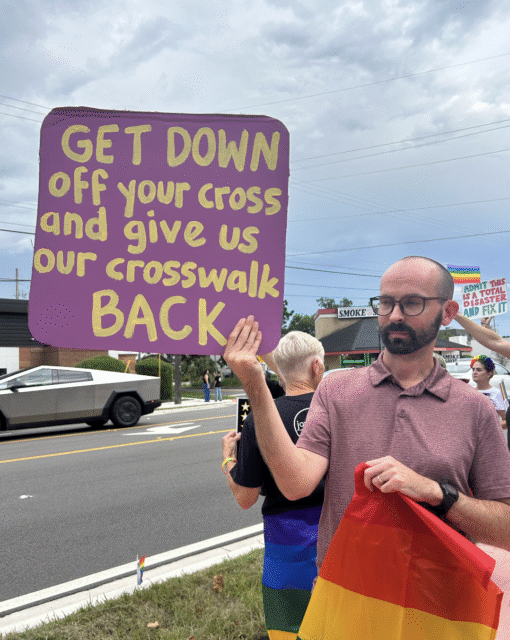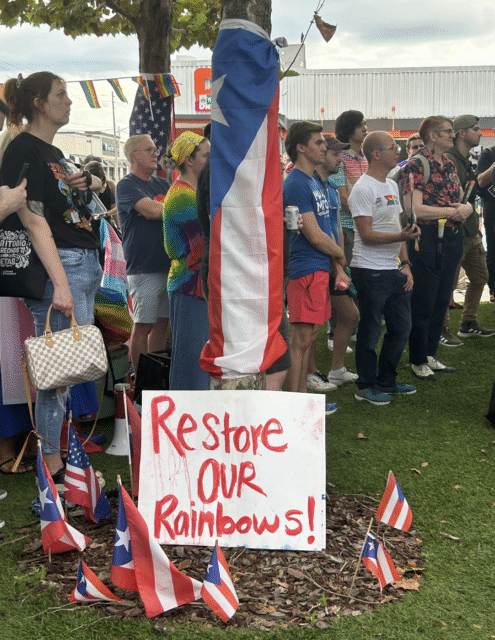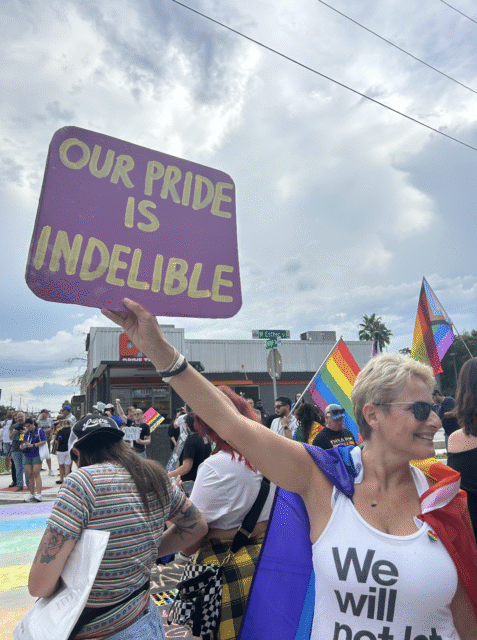Four LGBTQ+ rights advocates arrested for using sidewalk chalk at the site of the former Pulse nightclub memorial crosswalk have now been released without any charges, fueling concerns over the criminalization of peaceful protest and the ongoing erasure of queer symbols in public spaces.
The protesters, Orestes Sebastian Suarez, 29; Maryjane East, 25; Donavon Short, 26; and Zane Aparicio, 39, were each arrested over the past several days by Florida Highway Patrol (FHP) troopers. The official charge? “Defacing a traffic device.” Their alleged actions involved using chalk to restore rainbow patterns to a crosswalk that once commemorated the 49 lives lost in the 2016 Pulse nightclub shooting, one of the deadliest anti-LGBTQ+ attacks in U.S. history.
On Monday, however, all four individuals had been released without any pending charges, prompting questions about the arrests’ legitimacy and whether law enforcement had overstepped its authority in suppressing peaceful queer expression.

A Peaceful Protest, Met With Police
The protests began after the Florida Department of Transportation (FDOT), acting under direction from the Trump administration, removed the rainbow-painted crosswalk on August 21. The colorful intersection, located at W. Esther Street and S. Orange Avenue, had served as a highly visible tribute to Pulse victims and a symbol of LGBTQ+ pride and resilience in Orlando.

The state’s decision to erase it, reportedly as part of a broader directive to “eliminate distractions” from public roadways, was met with swift backlash. Activists returned to the site with chalk in hand, attempting to recreate the rainbow pattern in a temporary, non-destructive way.
One of the protesters, Suarez, told local news station WESH 2 that he simply used chalk on the soles of his shoes to walk across the crosswalk. “To be threatened with something so extreme as a felony charge for protesting and showing love to your fellow human, it’s just insane in my opinion,” he said.
Initially charged with defacing a traffic device, a law typically intended to prevent tampering with electronic signals or hardware, Suarez was released after a judge ruled that there was no probable cause for his arrest. His legal team argued that chalk, being water-soluble and easily washed away, does not constitute vandalism under Florida law.

Chalk, Charges, and Contradictions
Despite the non-permanent nature of the protest, FHP moved forward with additional arrests over the weekend. East, Short, and Aparicio were detained after similar chalk demonstrations at the same intersection. Yet none of them will face charges either.
At a court hearing Monday, a judge did find probable cause for the arrest of the three remaining protesters, but the state opted not to pursue charges. The reason behind this decision remains unclear, as both the FHP and local prosecutors have declined to comment.
Their attorney, Blake Simons, called the arrests a clear case of overreach. “I would argue water-soluble chalk that washes away while you’re being arrested doesn’t amount to over $1,000 worth of damage,” he told The Orlando Sentinel.
The FDOT estimated that restoring the crosswalk cost around $1,562, a figure that critics say is inflated and being used to justify the crackdown on peaceful protest.
A Symbol Removed, A Community Mobilized
For many in the Orlando LGBTQ+ community, the rainbow crosswalk was far more than paint. It was a symbol of visibility, remembrance, and love. Its sudden removal, reportedly executed in the dead of night, has left many feeling erased.
“My friends died here. That’s it. This is their memorial,” said protester Robby Dodd in an interview with Click Orlando. Others at the demonstration noted that police seemed uncertain about the laws they were citing, often backing off when challenged by protesters to explain their authority.
Republican Governor Ron DeSantis has supported the removal of rainbow crosswalks, arguing they pose a distraction to drivers. But an analysis by the Orlando Sentinel and other national studies suggests the opposite: decorative crosswalks may actually improve pedestrian safety by drawing more attention to intersections.
Ongoing Backlash Against LGBTQ+ Visibility
The chalk protests and resulting arrests come amid a broader climate of anti-LGBTQ+ policy in Florida. Under DeSantis’ leadership, the state has enacted sweeping restrictions on trans healthcare, LGBTQ+ discussions in classrooms, drag performances, and inclusive books in school libraries.
Advocates argue that the crackdown on public art like the Pulse crosswalk is part of the same agenda, a campaign to sanitize public space of queer presence.



